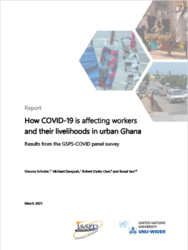Report
How COVID-19 is affecting workers and their livelihoods in urban Ghana
Results from the GSPS-COVID panel survey
This survey is a collaborative project conducted by researchers of the United Nations University World Institute for Development Economics Research (UNU-WIDER) and the Institute of Statistical, Social and Economic Research (ISSER), University of Ghana, Legon.
It presents one of the few datasets that allow assessing the immediate and near-term impact of the COVID-19 pandemic and related policy measures on labour market outcomes in sub-Saharan Africa, focusing on the livelihoods of workers in urban Ghana. The data has been collected on a purposefully selected subsample drawn from the 2018/19 Ghana Socioeconomic Panel Survey (GSPS), a regionally representative multipurpose panel survey.
Key findings are
- Government response measures: The majority of respondents saw strong changes in their life attributable to the pandemic, and about two out of three (62.6 per cent) reported unemployment or loss of income as the aspect that impacted them the most. Despite these pressing concerns, 95.6 per cent expressed support for the implementation of confinement and closure policies. A somewhat smaller but yet large share, 84.8 per cent, supported the relaxation of these measures.
- Economic impact: Overall, 84.3 per cent of respondents reported a decline in household income since the start of the coronavirus pandemic, and 41.9 per cent said that their household had lost its main source of income, in most cases being derived from the labour market. In the face of this income shock, the share of respondents running out of money to buy food surged by 34.6 percentage points from February to April 2020. Despite clear signs of recovery in subsequent months, the incidence of food poverty in the sample was still 11 percentage points higher in August/September 2020 compared to the pre-COVID-19 level.
- Labour market impact: Job losses during the early phases of the pandemic were significantly more sizable in districts affected by the partial lockdown: only one out of three respondents (34.5 per cent) in districts under lockdown continued working throughout April 2020, compared to two out of three (66.7 per cent) in no-lockdown districts. Two-thirds (67.9 per cent) saw workplace and business closures due to government regulations as the main reason for this break in economic activity. The recovery in employment up to August/September 2020 has been strong but uneven. While the gap in employment outcomes between locations subject to different lockdown policies had closed, employment was still 14.7 percentage points lower compared to the pre-pandemic level, and average weekly earnings had reduced by 18.2 per cent. The impact was felt the most by low-income earners in informal work and women, who were more likely to drop out of work in the early phases of the pandemic and saw a slower recovery in both employment and earnings.
The findings indicate that the COVID-19 pandemic was acutely felt in the labour market, accentuating existing inequalities. While the lockdown of Ghana’s metropolitan centres was short-lived and labour markets subsequently witnessed a strong but partial recovery, the economic burden of the pandemic continues to fall on the most vulnerable. To avoid a backsliding in Ghana’s progress on reducing poverty and mitigate pressures to inequality, future containment policies will need to be coupled with protective measures that address the needs of those at risk of being left behind in the crisis.
 Join the network
Join the network